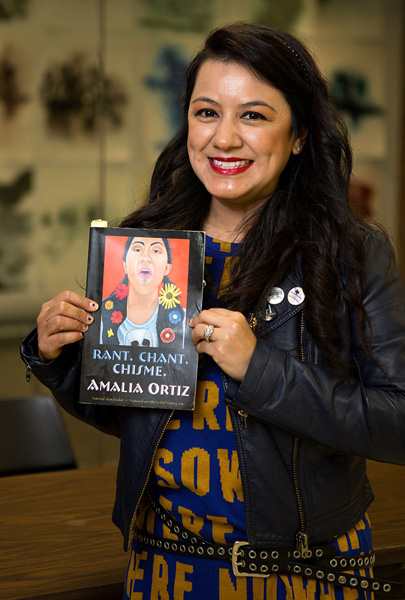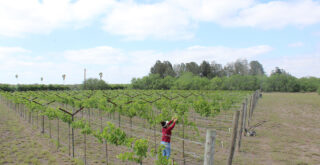- National Library Week in Los Fresnos
- Lady Falcons are Class 6A Champions
- New Beauty Clinic Opens Up in Los Fresnos
- “Houston’s Most Notable” —Los Fresnos Raised
- Earth Day 2024 coming April 6th in Los Fresnos
- Another Successful Golf Tournament for the Leo Aguilar Foundation
- Back to The Moon Again
- March 2024 Your Health Matters
- Lady Falcons in Tournament Play
- Easter Fun at Big Red’s Ranch
Book of Poetry by UTRGV Grad Student Amalia Ortiz Drawing National Praise
- Updated: February 8, 2016
by Gail Fagan/UTRGV

Acclaimed poet and performance artist Amalia Ortiz, currently a graduate student at UTRGV studying creative writing, has been named to the NBC Latino News list of “Ten Great Latino Books Published in 2015,” for her book, “Rant. Chant. Chisme.” Photo: UTRGV
RIO GRANDE VALLEY, TEXAS – Amalia Ortiz has built her career on a love of poetry and performance, becoming a nationally known spoken-word poet and slam poetry artist.
A Valley native and Master of Fine Arts (MFA) student in the Creative Writing program at The University of Texas Rio Grande Valley, Ortiz can now add “highly regarded author” to her résumé: Her book “Rant. Chant. Chisme.” was published early last year by Wings Press and has been named to the NBC Latino News list of “Ten Great Latino Books Published in 2015.”
The top 10 list includes works by such authors as Sandra Cisneros and Isabel Allende.
“I never expected to ever be on an end-of-the-year best book list,” Ortiz admits. “I’m humbled by it, but take it with a grain of salt because my top 10 best book list would be completely different.”
The book – a compilation of performance poems composed over a number of years – captures border tales on topics as varied as female bullfighting and Elvis Presley to immigration and the murdered women of Juárez.
NBC Latino News describes “Rant. Chant. Chisme.” as a successful transformation of chisme (gossip) into “a way to share the uncomfortable, humorous and hopeful of her peoples.” Texas’ 2015 Poet Laureate Dr. Carmen Tafolla said the book “stands up and dances off the page! It sings, it chants, it howls, it performs.”
Ortiz, 44, who was raised in La Feria, said growing up on the border has led her to write a lot about social justice, border injustice and feminist topics.
“I consider myself a political poet. My poetry is my activism,” Ortiz said.
She learned early on a love of performing, earning top awards in debating while in high school. During visits to Chicago where her brother attended college, she was exposed to the growing scene and popularity of performance poetry and poetry slams. After stints in various colleges, including UTRGV legacy institution UT Pan American, she earned her bachelor’s degree in theatre in 1996 from San Antonio’s University of the Incarnate Word.
“My first job was at the Guadalupe Theatre in San Antonio where I saw a lot of performers who wrote their own work. They told me if I waited around to be just another actor, that I would be a dime a dozen. My strength would be if I could write my own work,” she said.
Ortiz appeared on three seasons of “Russel Simmons Presents Def Poetry” which ran on HBO from 2002-2007:
Amalia Ortiz’s ‘Cat Calls’ on Def Jam Poetry
Amalia Ortiz’s ‘Some Days’ on Def Jam Poetry
Amalia Ortiz’s ‘Women of Juarez’ on Def Jam Poetry
She has toured a number of colleges and universities as a solo artist and performed with several performance poetry troupes. She has composed and performed in her musical, “Carmen de la Calle,” and presented the one-women stage show she wrote, “Otra Esa on the Public Transit,” in San Antonio and Houston.
She said her writing was influenced by Tafolla, a noted San Antonio author, as well as musician poets like Maggie Estep, Pattie Smith and others. Especially inspiring to her were author and poet Michele Serros and writer-comedian Luis Alvaro.
“Both were doing spoken work in the early ’90s. Both had an impact on me because I saw Latinos doing an art form that that I didn’t see too many Latinos performing. I saw myself reflected in their work,” Ortiz said.
The UTRGV creative writing program faculty, particularly Associate Professor Emmy Perez, helped her with the final edits of “Rant. Chant. Chisme.”
“The creative writing program at UTRGV is very kind to bilingual writers – that is one of the writing program’s strengths. The professors here understand the local community and, because of that, understand our stories and know that they need to be told bilingually,” said Ortiz, who also participates in an all-women performance collective at UTRGV titled “WAKE-UP!”
Perez is also the advisor on Ortiz’s MFA thesis, planned for publication as her second book. It is tentatively titled “The Canción Cannibal Cabaret” – about a person who eats songs, Ortiz said.
“The whole second book is also a musical. It is one part theatre, one part poetry,” Ortiz said. “Performance poetry takes poetry back to its roots. Poetry was originally an oral art form. Poets would memorize their songs or lines, and that was their way of passing on their stories.”
Perez said she has used Ortiz’s work and performance videos in her poetry writing courses for years, particularly her poem and performance video, “The Women of Juárez,” which documents a Chicana/Tejana/Fronteriza response to the femicides in Ciudad Juárez. That poem is included in Ortiz’s most recent book, Perez said, and she is looking forward to having an entire book of Ortiz’s poems to teach in her classes.
“While Amalia’s work lives in the minds and hearts of folks fortunate to view her performances, the publication of her book speaks to its power on the page, as well,” Perez said. “Her work is a treasure not only to the growing body of work published by Valley natives, but also to the necessary voices of protest. I believe it will prove to be an important book in Chicana/Tejana literature.”
Ortiz is among a number of other published authors like David Rice, who since graduating from UTPA with a creative writing MFA have published their work and received prestigious recognition and awards.
“Our program is unique because of its location – our borderlands community – and its student body,” Perez said.
Several of UTRGV’s creative writing students have opted to pursue a graduate certificate in Mexican American Studies along with their MFA in creative writing. UTRGV students can also choose to write their thesis projects entirely in Spanish, English or both. The program has on board at least five Latina/o faculty members, which is unique in terms of MFA programs nationwide, Perez said.
“Our workshops are welcoming spaces for cultural and linguistic exploration,” she said.
After years of hard work to be sustained as a working artist, Ortiz offered a few words of advice for aspiring young writers and poets, particularly Latinos.
“Find your own voice. That might take years, but it is a matter of becoming really clear about who you are and what you love,” she said. “Also, do what I was always told: “Read, read, read and write, write, write.”





